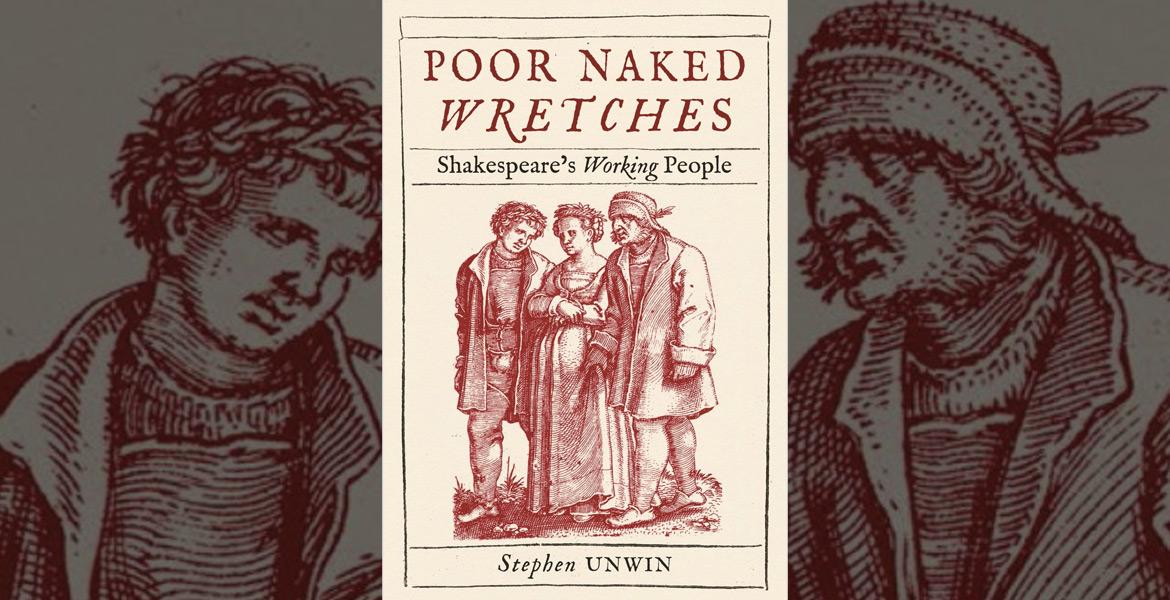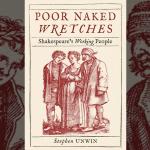Stephen Unwin, Poor Naked Wretches
Poor Naked Wretches: Shakespeare’s Working People is not the usual Shakespearean scholarship. It does not focus on individual plays, and nor does it consider the normal movers and shakers – the Hamlets, Lears, Romeos and Henrys – that tend to occupy such books. Instead, Stephen Unwin provides in-depth analysis of the little people as they appear across Shakespeare's works, the gravediggers, cannon-fodder, friars and players, who are so frequently overlooked. His aim is simple: to show that these characters are as equally intriguing and complex as the more familiar protagonists, and furthermore to unveil both the Tudor and Shakespeare's own attitudes to working people. This is an immensely difficult undertaking: Shakespeare’s own attitudes are famously elusive throughout his works – he specifically refers to contemporarySomeone or something living or occurring at the same time. events only once in all his plays, when the earl of Essex is mentioned in Henry V – and escaped the spells of incarceration experienced by many of his peers as a result. Yet the Bard has been proclaimed both as the ‘Soul of the age’ and as ‘not of an age, but for all time’: what better body of work is there, then, to explore such ‘timeless’ concepts as ‘the working class’? Both quotations from the same poem, written by Ben Jonson.
Both quotations from the same poem, written by Ben Jonson.
Unwin's strength is that he comes from a theatrical background, and has spent years working to bring these people to life on the stage. This first-hand, practical experience informs every chapter of this well-considered and detailed text. Throughout its pages, the reader gets the sense that each example, each paragraph, is based on decades of discussions, trials and errors. It is obvious that Unwin knows the plays inside-out, not just as texts to be examined but as living, breathing entities that, when performed, represent all of the varying shades of humanity. His familiarity with Shakespeare may at times lead him to forget that not everyone is as knowledgeable, however, and his arrangement of the book – by trade or social role (peasants, maids, soldiers, criminals, etc), rather than by play – can occasionally make it hard to follow. Not everyone will be familiar with Coriolanus, for example, and might not immediately grasp the character or situation under discussion. Some expositionA comprehensive description or explanation of an idea. would, therefore, have been useful. Nevertheless, his appreciation of the genius of Shakespeare is palpable and contagious; his love of the theatre equally so.
Because Poor Naked Wretches is above all a work of literary criticism, its history can, however, let it down. Rather than particular facts being at issue – although I have been unable to trace and verify a few – it is the framework in which they are presented that can jar: the use of anachronistic concepts, such as ‘class’ in a pre-industrial society, is convenient yet careless. When this is combined with some reasonably outdated scholarship – such as an unquestioning assumption that class war led to civil war – and within a Marxist structure, it feels that this new book was published fifty years ago. In many ways, Unwin seems to be arguing against a theory that was laid to rest before the turn of the millennium.
This is a shame, because Unwin has got some fantastic things to say and points to make. Thankfully coming down against a Marxist interpretation of Shakespeare, he points out that the playwright had astounding powers of observation and used these to capture the everyday life of working people in a way that no other contemporary managed. Unwin’s argument, that Shakespeare's plays provide a wonderful glimpse into the past, is sound. Directors and actors would be wise to see his characters as fully formed people who could have been picked off the streets of Tudor or early Stuart London, rather than as archetypes of some ‘timeless’ struggle that did not actually exist in Shakespeare’s day. The playwright wrote his characters in all their convoluted, contradictory brilliance, and we might, in fact, be missing the point when we oversimplify or attempt to force them into ill-fitting boxes. In a time when Romeo is far too frequently being turned into a gun-toting trust fund baby – a particular bugbear of mine – it is refreshing to find a director who is knowledgeable about, and sympathetic to, Shakespeare's original characters, in all their diverse forms and glory.
- Log in to post comments




